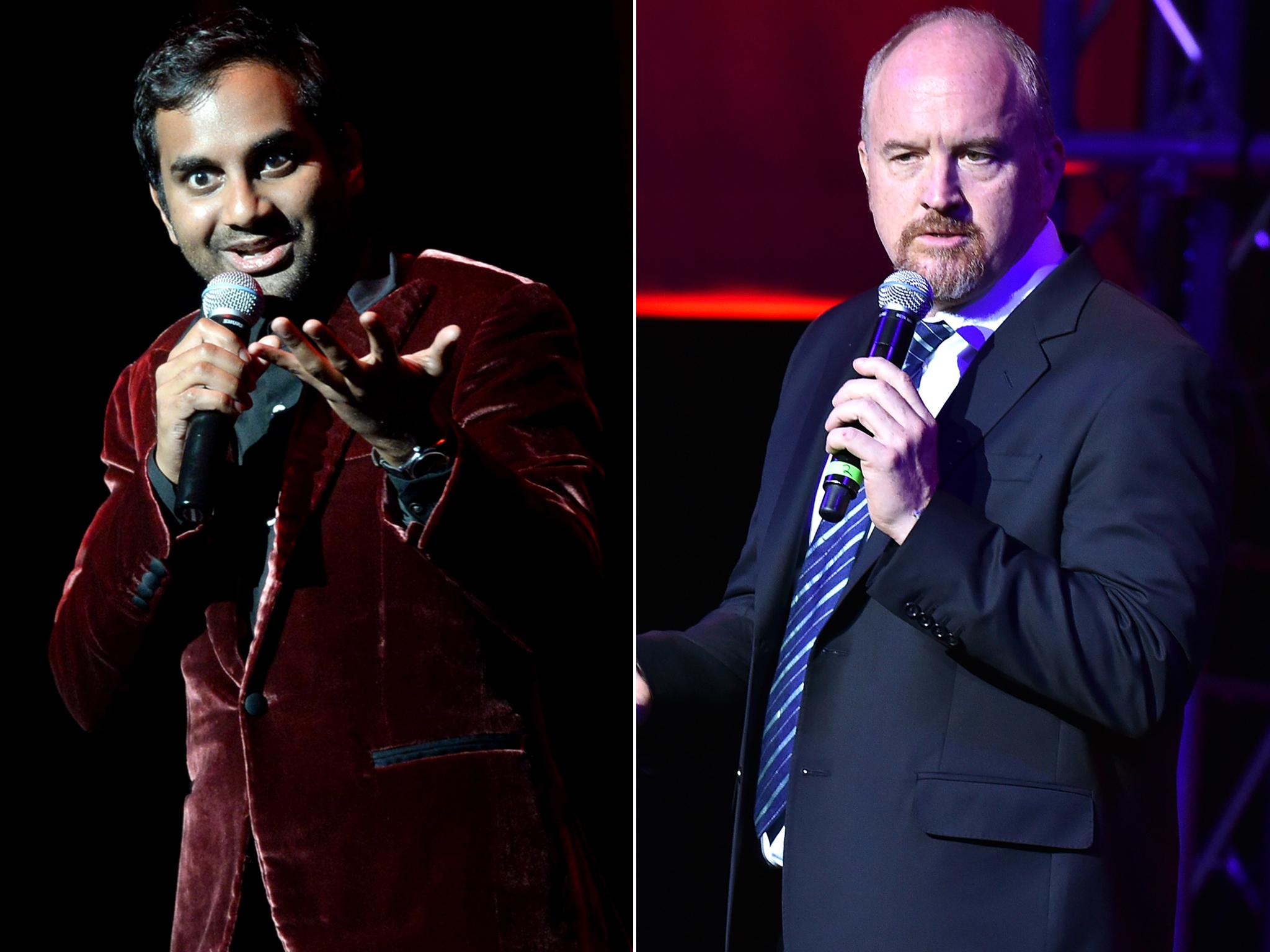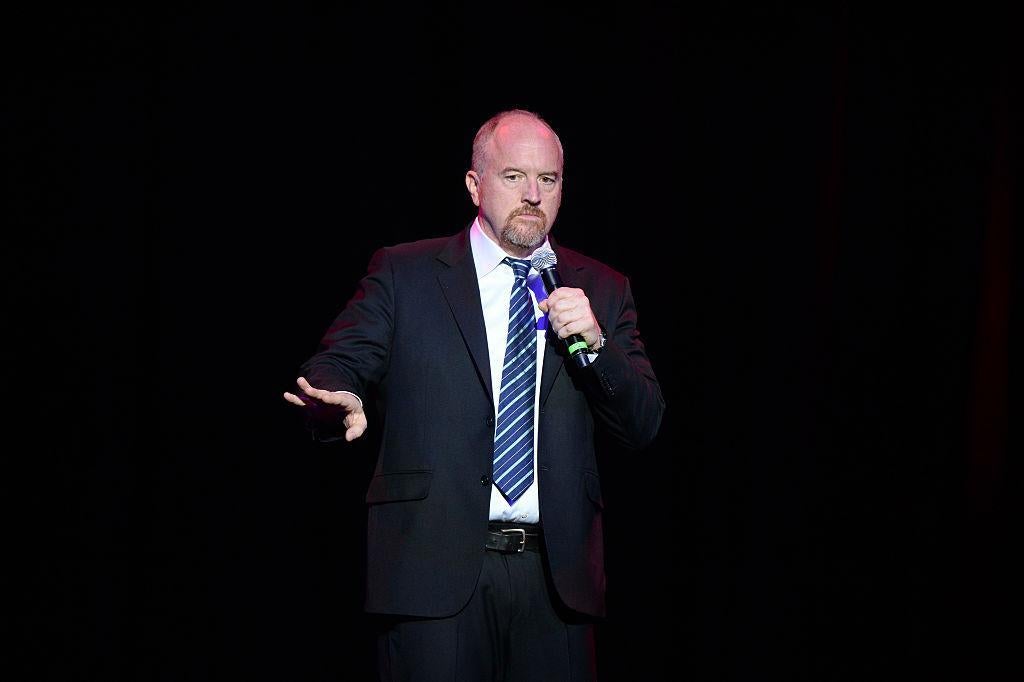Should Aziz Ansari and Louis CK talk about accusations on stage?
Male comics caught up in #MeToo are now returning to performing live. But their failure to address the topic reveals a fearfulness that sits oddly in stand-up

Your support helps us to tell the story
From reproductive rights to climate change to Big Tech, The Independent is on the ground when the story is developing. Whether it's investigating the financials of Elon Musk's pro-Trump PAC or producing our latest documentary, 'The A Word', which shines a light on the American women fighting for reproductive rights, we know how important it is to parse out the facts from the messaging.
At such a critical moment in US history, we need reporters on the ground. Your donation allows us to keep sending journalists to speak to both sides of the story.
The Independent is trusted by Americans across the entire political spectrum. And unlike many other quality news outlets, we choose not to lock Americans out of our reporting and analysis with paywalls. We believe quality journalism should be available to everyone, paid for by those who can afford it.
Your support makes all the difference.On a Saturday night this month in a cavernous theatre in a casino, an Aziz Ansari I had never seen before strode onstage. Wearing a black leather jacket and skinny jeans, he looked the same, but the old swagger was diminished, replaced by a certain world-weary exasperation.
He began his set with a series of jokes poking fun at progressives who get furious online. He mocked the early summer uproar over cultural appropriation and a white girl from Utah who wore a kimono to prom, and sighed at those who criticised The Simpsons for the Indian character Apu. Later, he skewered competitive virtue signalling, describing it as a game of “progressive Candy Crush”. The show’s major theme was contempt for “people trying to outwoke each other” online.
What went unsaid was that since the last time he toured new material, Ansari had become the high-profile subject of an internet furore himself. An anonymous woman had published a detailed article about a date with him and accused him of inappropriate behaviour. (Ansari has said that their encounter was consensual.) The article drew viral outrage, an equally forceful backlash and much commentary about dating culture and the #MeToo movement.
Ansari is now one of several male comics returning to the stage after facing scrutiny for sexual conduct. TJ Miller, who has been accused of sexual assault and denied the allegations, is performing around the country. And most famously, Louis CK, who admitted to misconduct, has been working out new material primarily in short club sets, though he did an hour at a club in Long Island on Sunday, presumably laying the groundwork for a special.

Whether and how these men should return has been debated endlessly. They are back, and while their new work will raise political and moral questions, it also poses an artistic one: should they talk about the accusations and their experience onstage?
Ansari is a case study in the dangers of avoiding the subject, in part because his new act is such a reversal from his previous work. Among comics who play arenas, there has never been a more woke stand-up. Before he landed on a list of creepy men, he did politically conscientious bits about the scourge of creepy men. Before he talked dismissively about the critique of Apu, he actually appeared in the Hari Kondabolu documentary that criticised Apu. Perhaps having his private life revealed has not informed Ansari’s sudden shift in perspective, but I would be surprised.
Unless you know his personal story, some of his joke premises come off as coy, even nonsensical. For instance, he breaks the world down into three groups: hard-core Trump people, hard-core woke people and everyone else, a situation he compares to a Biggie-Tupac feud with Boyz II Men trying to stay out of it.
Considering woke people online have much less power, clout and influence than the president, this is an odd way to view the world. But it is possible to see how Ansari might think otherwise, how he feels alienated both from an administration he disagrees with and from those who associated him with Harvey Weinstein, Matt Lauer and other recently disgraced men. Ignoring his personal experience leaves a gaping hole in his act. Audience members who don’t know the back story might find this premise baffling. Those who do may see it as evasive.
But is it? Art often makes points through metaphor and indirection. Arthur Miller didn’t need to mention the Red Scare in The Crucible to say something trenchant about it. So why is Ansari different?
The answer has to do with the peculiar nature of stand-up, an art form in which the elephant in the room does not lurk in the background. It stands right in front of the microphone and raises its trunk to the ceiling.
To illustrate why, a quick tangent: The only time I met Louis CK was backstage at a comedy theatre while I was working on an unrelated story several years ago. Louis CK made a surprise drop-in and told a joke about something funny his daughter said to him, and since like him, I have two daughters, the older one around the same age as his younger one, this sparked my curiosity. When he walked backstage, I asked him which of his kids was he referring to. His response: “I just made that up.”
I cover stand-up for a living and am well aware of its contrivances, and yet, I confess I was surprised, which is a testament to his skill but also, I believe, to the conventions of stand-up. If the stories about Bill Cosby and Louis CK have taught us anything, it is that we can’t trust the veracity of the personas comedians put forth for consumption, let alone the details of their jokes. But when gifted artists walk onstage presenting as themselves and tell the audience something about their lives, our first instinct is to believe it. Maybe we are gullible or naive, but that is why stand-up personas make such good springboards for memoirs or sitcoms. It also helps explain the success of stand-up, the resilient allure of authenticity, the most overrated of virtues, and the challenge of comics who have lost trust with their audience.
The persona of Aziz Ansari rested on the construction that he was a progressive guy sensitive to dating mores. (He even wrote a book called Modern Romance.) Louis CK's persona was more complex. He persistently talked about sexual perversion and immorality but also led fans to believe that he was ultimately a good guy. He initially ignored his misconduct when he returned to performing but has reportedly started to talk about it onstage, and we will have to wait to see how his approach works. One major downside when someone as prominent as Louis CK brings up these stories is that the victims have no say in the matter and are dragged back into the experience.

For swathes of their audience, the news about these men was not just disappointing. It was a betrayal of their work. That is why the earlier versions of these comics are essentially dead. They can’t use some of their tools as they once did, and to flourish, they might have to find new ones. To some degree, Ansari already has. He is a different comic: crankier, older, the kind of guy who says he doesn’t understand the younger generation.
Ansari’s strength has never been in the originality of his jokes. He does a spin on a famous Jeff Foxworthy bit that has been done many times – in this case, Ansari says: “If you’ve had an arranged marriage, but it’s to your cousin, you might be an Indian redneck.”
He has also never been the most introspective of comics. So digging into his past onstage would be outside his comfort zone. There are clearly dangers to bringing up the date story that went viral, but there is also potential. Hearing a personal standpoint would be compelling.
There is so much talk in the culture about what stand-up comics should or should not do, about the lines they are or are not allowed to cross. But perhaps there has not been enough consideration of the perils of too much caution.
It is hard to be a Kanye West fan in 2018, Ansari said in the show this month, adding that he is going to stick with him. Some surely feel the same about Ansari. But comics have long been articulating things that audiences think and would never say out loud. So to leave the thing people are thinking unsaid not only defies expectations, it also reveals a fearfulness that has never been the foundation of great art.
Sometimes, the safest bet is to take a risk.
© The New York Times
Join our commenting forum
Join thought-provoking conversations, follow other Independent readers and see their replies
Comments